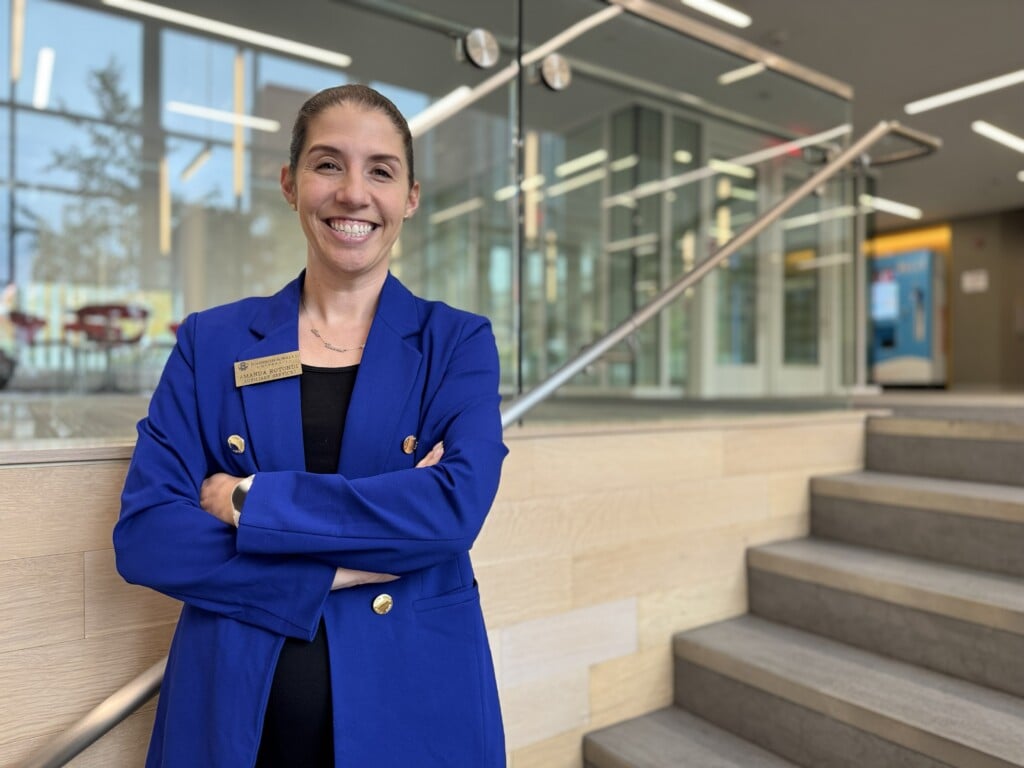Peace on Earth
Reporter Ellen Liberman examines the rise of antisemitism in Rhode Island, which preceded the current political climate.
On the first day of the Jewish month of Tishrei, the community greets Rosh Hashanah, the New Year. The ten-day period, culminating with Yom Kippur, the Day of Atonement, is a time of reflection and repentance, to pay debts, seek forgiveness from those you have wronged and rededicate yourself to being an ethical person.
At Temple Emanu-El, on Providence’s East Side, the congregation holds this synchronic private and communal dialogue with God in the style of worship that best suits.
Young families pray under an outdoor gazebo, where children are free to squirm. In the Soulful Service, they sway to a strumming guitar. The Alperin Meeting House service offers an intimate setting, where attendees receive the blasts of the shofar under pink lighting and draped fabric panels. In the main sanctuary, cantor Brian Mayer chants the Hineni, a meditation on the humbling act of prayer. The chorus holds a single, stirring note in counterpoint to the plaintive melody. Mayer’s voice rises above the note, all the way up to the domed ceiling, where it resonates as a sound and a supplication:
“Here I am,” he sings in Hebrew.
This year, the second day of Rosh Hashanah fell on a quiet September morning. As congregants exchanged wishes for a healthy and happy new year inside, a detail of burly Providence police officers guarded the outside to ensure a peaceful new year.
October’s brutal attack on Israel by the Palestinian political and militant organization Hamas, designated by the U.S. Secretary of State as a terrorist group, makes that less likely. In the immediate aftermath of rocket strikes from Gaza and the Israeli response, an estimated 9,400 — including 8,000 Palestinians and at least twenty-five Americans — died. The documented atrocities committed by Hamas and the civilian toll of death and displacement in Gaza have provoked widespread condemnation of both sides. The United States saw a wave of clashing rallies between pro-Palestinian and Israeli groups. Governor Dan McKee apparently fired a staffer for social media posts accusing Israel of genocide. A Pawtucket man was arrested for allegedly making a bomb threat to Temple Beth-El in Providence.
In the two weeks following the attack, the Anti-Defamation League reported a 388 percent spike in antisemitic incidents in the U.S., where the number of assaults, threats, vandalism and harassment had already risen in 2022 by more than 35 percent to 3,697 — the highest total since the ADL began tracking them in 1979. Similarly, the New England region saw a 32 percent increase in 2022, with 204 antisemitic incidents, including 142 white supremacist propaganda incidents. The Jewish Alliance of Greater Rhode Island, which does its own accounting, recorded a 250 percent jump between June 2022 and 2023, from thirteen to forty-four.
“Even before, we had tracked an alarming rise in antisemitic incidents throughout New England,” says Rabbi Jonah Steinberg, director of the ADL’s New England region. “Since the Hamas attack, Jewish communities and individuals of all backgrounds and faiths who care about Israel have felt even more vulnerable and, in some instances, have been menaced, threatened and shunned. We do not yet know the full extent of the devastation Hamas has perpetrated, and we do not yet know what all the consequences will be, but we are working at full tilt with communities, with schools [and] with law enforcement, and responding to many and varied situations.”
The last few years have seen antisemitism reach its highest levels of violence in the United States. In January 2022, a gunman held four people hostage at Congregation Beth Israel in Colleyville, Texas. The hostages escaped and the FBI shot and killed him. In April 2019, a shooter killed one woman and wounded three individuals at the Chabad of Poway, California, at a small study group; in 2021 he was sentenced to life without parole. Eleven congregants of Pittsburgh’s Tree of Life synagogue were killed, and six others wounded, during services in October 2018. The perpetrator was found guilty of sixty-three federal counts and sentenced to death in August of this year.
Antisemitism, often called the world’s oldest hatred, waxes and wanes according to external factors — economic downturns, pandemics, societal conflicts. Its shape has shifted over two millennia, but the antipathy remains tightly wrapped around a core of negative stereotypes and false tropes about the tiny minority’s outsized power and divided loyalties. (In 2022, Jews comprised 2.2 percent of the U.S. population, and 1.7 percent of the state population.) The current flare-up, however, burns more brightly than any other time in recent memory.
Adam Greenman, president of the Jewish Alliance, attributes it to “a high-tension political environment” and “the rise of social media. In the past, folks who held antisemitic, racist and neo-Nazi views, in particular, were in their own community and couldn’t connect with people who had similar views. Social media makes that so much easier now. The third piece is there’s not enough calling out from people outside the Jewish community. These incidents become normalized.”
And these sentiments have been amplified by high-profile figures, such as X owner Elon Musk, NBA star Kyrie Irving and rapper Kanye West. In a Facebook post, GOP Congresswoman Marjorie Taylor Greene blamed California wildfires on Jewish space lasers. Former President Donald Trump marked Rosh Hashanah with this message: “Just a quick reminder for liberal Jews who voted to destroy America & Israel because you believed false narratives! Let’s hope you learned from your mistake & make better choices moving forward!”
“The modern [national] Republican party, as embodied and led by Trump, at this point has been significantly boosting extremist neo-Nazi and fringe hate groups — winking and nodding at them and giving tremendous elevation to [their] rhetoric,” says state Senator Sam Bell (D-Providence), a member of Temple Habonim. “And when you are a Jew in public life, you become a target.”
The community has reacted by enhancing security. Where synagogues once hired police officers to direct traffic after services, they now direct portions of their budgets to armed guards. Locked doors are common; temples elsewhere have installed metal detectors. The Jewish community is in regular communication with Rhode Island’s Fusion Center, a state-owned and operated group of law enforcement officers from state, municipal and federal agencies that receives and assesses threat information.
“We have security each and every weekend, and for every major program at Beth-El,” says Rabbi Sarah Mack. “It became pretty apparent to us after Pittsburgh that this was the new step we were going to have to take. I don’t think it is reactive; I think it is realistic. Pittsburgh brought home that these unfortunate events do not happen in big cities alone.”
Beth Sholom Rabbi Barry Dolinger, current president of the Board of Rabbis of Greater Rhode Island and the victim of regular verbal assaults while walking to services, says that synagogues have different levels of security, based on resources. His small congregation had to divert funds from other programs — like the soup kitchen it runs — fundraise and, initially, assess each member a security fee. He received a special rabbinic dispensation to carry a cellphone on Shabbat — a prohibited activity during the Sabbath — in case he needed to summon help.
“Security costs a lot of money. During the Trump years we had it every week because of the actual and constant threats. Members were afraid to come if we didn’t have it,” he says.
Beyond that, there has been a debate within the community on the proper level of response, Bell says. “There’s a real tension between the need to call out the extremely problematic rise of antisemitism and at the same time, not to provide more oxygen to the trolls.”
But the fight is also proactive, and the prescriptions are many.
In October, on the heels of new policy directives extending the protections of the 1964 Civil Rights Act to antisemitism, Islamophobia and other religious discrimination in federal programs, the Biden administration strongly decried Hamas and antisemitism. Locally, groups such as the Jewish Alliance and the Sandra Bornstein Holocaust Education Center support hate crimes legislation, make presentations to children on the history of the Holocaust, work with school officials and the business community, and conduct anti-bias training for law enforcement and bystander intervention trainings.
Rabbi Josh Bolton, executive director of Brown RISD Hillel, says the best strategy is to focus “on Jewish growth.”
“Last year, nearly 30 percent of the entire undergraduate population participated in events or experiences connected to Brown RISD Hillel. Jewish life is seen as one of the great platforms at the university relevant beyond the boundaries of Jewish students. Our core response is to build an increasingly diverse, vital, strong Jewish community.”
Jim Vincent, former president of the NAACP Providence Branch, believes in better data and more dialogue.
“We need to educate the community on how to report hate crimes — to know the level of hatred that is out there, and then we have to go into those communities that are more likely to perpetrate hate and talk it out.”
Finally, there’s the power of alliances. Antisemitism has its own flavor, but it is of a piece with other hatreds — homophobia, racism and xenophobia, to name a few. The state’s clergy often come together to denounce such incidents.
“It is really important that whatever the minority group being targeted, that they speak out for themselves, but it is also important that there be allies standing next to them,” says the Rev. Dr. Donnie Anderson, co-chair of the Rhode Island Commission on Prejudice and Bias. “We need to stand together shoulder-to-shoulder to protect one another.”
The latest Israeli-Palestinian conflict has strengthened local longstanding partnerships; this month, the Jewish Alliance is asking its allies to “shine a light on antisemitism” by displaying a paper menorah in solidarity with the Jewish community. December often coincides with Hanukkah. Over eight days, Jews eat potato pancakes, exchange gifts and light the menorah. In the second century BCE, the Maccabees, a small band of Jewish soldiers, retook the temple in Jerusalem from King Antiochus IV Epiphanes, who had outlawed Judaism and defiled the temple with Greek religious symbols. As part of its restoration, the Maccabees relit the eternal flame, which symbolizes God’s presence. There was only enough oil for one day; nonetheless, the light burned for eight until more could be found. Today, Hanukkah is celebrated as a victory over religious persecution.
In some ways, it is a Rhode Island story. In 1636, Roger Williams rebelled against the religious prohibitions of the Massachusetts Puritans and established the Providence settlement. The first Jews arrived in Newport from Barbados in 1658. The Touro Synagogue, built there in 1763, drew praise from President George Washington, who promised that the government would “give to bigotry no sanction, to persecution no assistance.”
“There’s a moral imperative that underlines this state — the idea that it was founded on religious freedom,” says Greenman. “We want to call people back to these founding principles.”
_________________
Ellen Liberman is an award-winning journalist who has commented on politics and reported on government affairs for more than two decades.


























